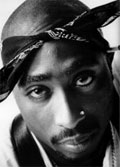- Articles Index
- Monthly Features
- General History Articles
- Ancient Near East
- Classical Europe and Mediterranean
- East Asia
- Steppes & Central Asia
- South and SE Asia
- Medieval Europe
- Medieval Iran & Islamic Middle East
- African History (-1750)
- Pre-Columbian Americas
- Early Modern Era
- 19'th Century (1789-1914)
- 20'th Century
- 21'st Century
- Total Quiz Archive
- Access Account
The Heroic Code Lingers to this Day: Homer & Gangsta Rap
By Hugoestr, 2006; Revised
Category: General History Articles
| An almost universal feature found among cultures is a heroic honor code, that serves as an ideal for males, and many females, to live up to. I am sure that a deeper survey of cultures, especially the hunter-gatherer ones, will show that this code is not universal. A heroic code, after all, seems to demand war, or at least, a culture of violence. Unfortunately, violence and war is part of the historic memories of most ethnic groups and cultures alive today, and, for all practical purposes, it is universal.
In today’s U.S., one place to find it is in Gansta Rap. The songs of these urban anti-heroes are recited in verse, with music in the background marking the beat. In many of the lyrics there is a definition of being a man, although there seems to be some confusion on what that definitions consists in. Another interesting feature of Gangsta Rap is how they admit weaknesses such as admitting to feeling alone and not love or wondering if they are going to be forgiven for their acts. However, they often return back to the hard, courageous, one-man stand, declaring that they will not back down from anyone and re-declaring their vow to live a life of violence. What is amazing is that so much of the heroic code and themes of Gansta Rap is found in Homer. I will only share a couple of textual comparison between Tupac’s “Outlaw” and Homer’s “Iliad.” Please focus on the motifs. The way of expressing the same ideas are different—and I personally prefer Homer. This exercise is, after all, an exploration to see how ancient ideas live with us today. Both Tupac and Homer are preoccupied with death, and how one shouldn’t run away from it once the cycle has started. In the two passages below, each writer is reluctant to encourage violence, but they both feel that once violence has occurred, one has a duty to confront it. cause all I see is Murder murder my mind state preoccupied with homicide tryin to survive through this trial and rape dead bodies at block parties those unlucky bastards gunfire now they require maybe closed casket who can you blame ?
would be able to live on forever, ageless, immortal, so neither would I myself go on fighting in the foremost nor would I urge you into the fighting where men win glory. But now, seeing that the spirits of death stand close about us in their thousands, no man can turn aside nor escape them, let us go on and win glory for ourselves or yield it to others. This is the second and last comparison. In these fragments, they both express the idea of immortality through one’s deeds. but never worry they'll remember me through history causen motherf**kers to bleed they'll label me an [outlaw.] "My mother Thetis tells me that there are two ways in which I may meet my end. If I stay here and fight, I shall not return alive but my name will live for ever: whereas if I go home my name will die, but it will be long ere death shall take me.” Some people will object to creating similarities between urban gangs and the royal characters of the Iliad, but if we objectively see the actions of both groups, they are remarkably similar. They both have champions, they both are violent, they both have honor to uphold. They both band together by mutual friendship. And they are both ruthless people. The urban gang code, focused on criminal activity and rooted in a chaotic culture, has a lot of doubts about its code and its lifestyle and many of its values are skewed, but the essence is the same: don’t back from violence, uphold your honor, and don’t be afraid of dying. The heroic code is still alive. |



